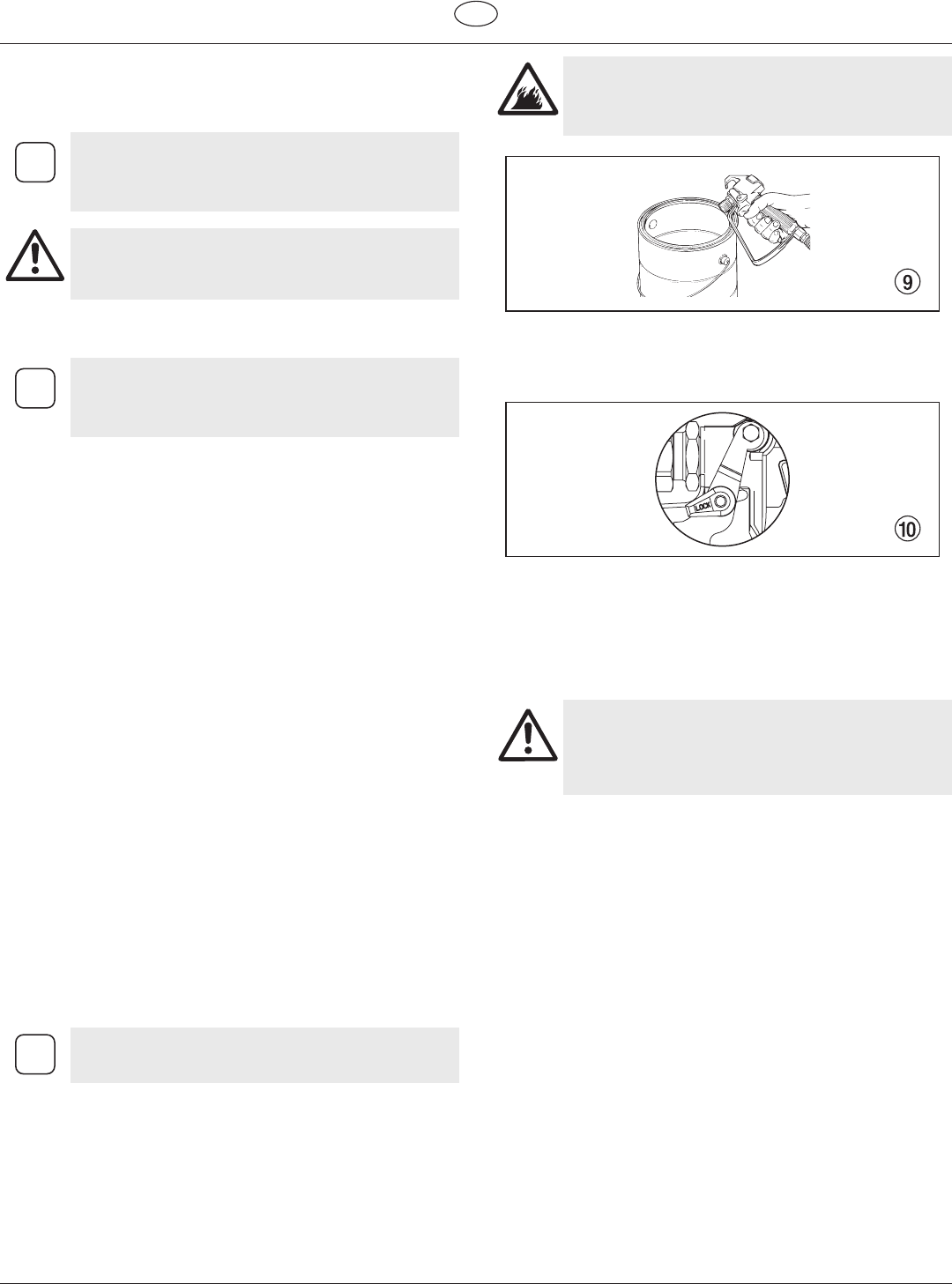
Earth the gun by holding it against the edge of the
metal container while flushing. Failure to do so may
lead to a static electric discharge, which may cause
a fire.
14. Trigger the gun into the metal waste container until the old
solvent is gone and fresh solvent is coming out of the gun.
15. Lock the gun by turning the gun trigger lock to the locked
position (g 10).
16. Set down the gun and increase the pressure by turning the
pressure control knob slowly clockwise to its highest setting.
17. Check the entire system for leaks. If leaks occur, turn the
sprayer o and follow the “Pressure Relief Procedure” in this
manual before tightening any ttings or hoses.
18. Follow the “Pressure Relief Procedure” (section 4.5) in this
manual before changing from solvent to paint.
Be sure to follow the Pressure Relief Procedure when
shutting the unit down for any purpose, including
servicing or adjusting any part of the spray system,
changing or cleaning spray tips, or preparing for
cleanup.
4.3 Preparing to Paint
Before painting, it is important to make sure that the uid in the
system is compatible with the paint that is going to be used.
i
Incompatible uids and paint may cause the valves
to become stuck closed, which would require
disassembly and cleaning of the sprayer’s uid
section.
Attention
Always keep the trigger lock on the spray gun in the
locked position while preparing the system.
1. Place the siphon tube into a container of the appropriate
solvent for the material being sprayed.
i
If you are spraying a water-based latex, ush with
warm, clean water. If you are using any other
material, check with the material manufacturer for a
compatible solvent.
2. Place the bleed hose into a metal waste container.
3. Turn the pressure control knob fully counterclockwise to its
lowest pressure setting (g 7, 1).
4. Open the hydraulic shut-o valve (2) located on the hydraulic
pressure hose. The handle should be in line with the hose.
5. Open the bleed valve (3) by turning it fully counterclockwise.
6. Start the engine or turn on the electric motor.
a. To start the gas engine (g. 8),
• move the fuel valve lever (2) to the open position,
• move the throttle lever (3) to its middle point,
• move the choke lever (4) to the closed position for a cold
engine or to the open position for a warm engine,
• turn the engine switch (1) to the ON position, and
• pull the starter rope (5) briskly until the engine starts.
b. To start the electric motor, move the ON/OFF switch to the ON
position.
7. Turn the pressure control knob (1) clockwise approximately
1/3 of the way down to increase pressure until the sprayer
cycles evenly and solvent ows freely from the bleed hose.
8. Allow the sprayer to run for 15–30 seconds to ush the test
uid out through the bleed hose and into the waste container.
9. Turn o the sprayer.
a. To turn o the gas engine,
• set the pressure to minimum by turning the pressure control
knob fully counterclockwise,
• move the throttle lever to the slow position, and
• turn the engine switch to the OFF position.
b. To turn o the electric motor,
• set the pressure to minimum by turning the pressure control
knob fully counterclockwise,
• move the ON/OFF switch to the OFF position.
Make sure that the spray gun does not have a tip or
tip guard installed.
10. Close the bleed valve by turning it fully clockwise.
11. Start the engine or turn on the electric motor.
12. Turn the pressure control knob clockwise approximately 1/3
of the way down to increase pressure.
13. Unlock the gun by turning the gun trigger lock to the
unlocked position.
12 PowrTwin Plus
GB
Operation
